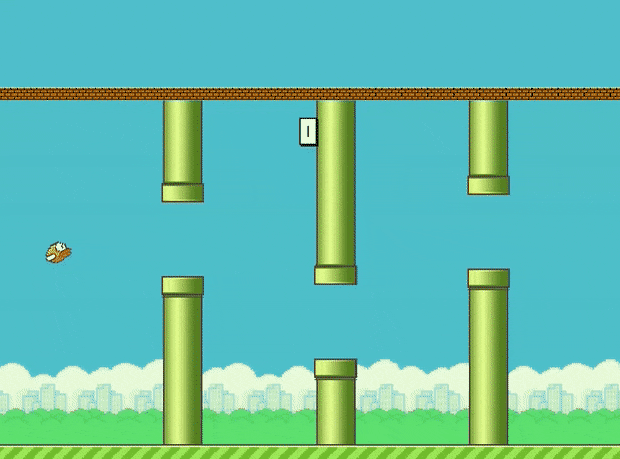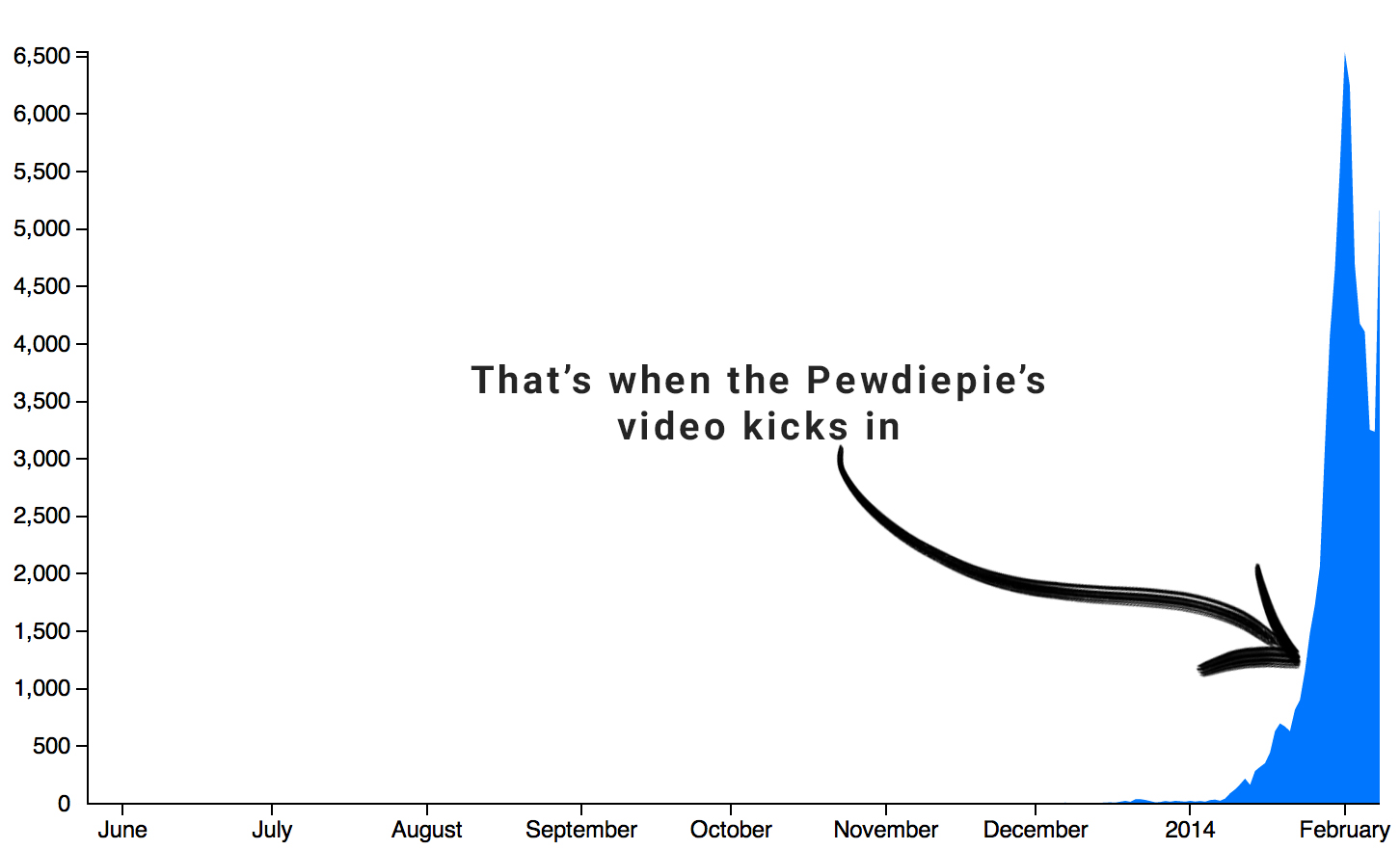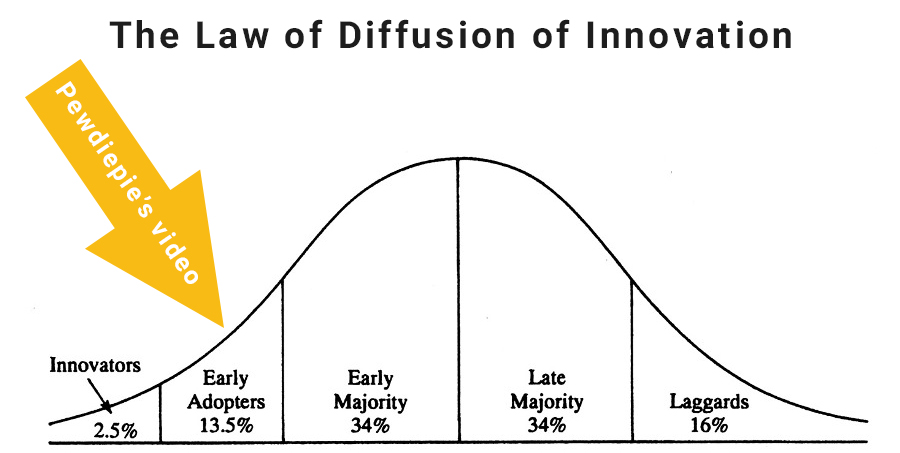
How Flappy Bird Became Popular – From A Single Developer To 50M Downloads
Flappy Bird – a simple mobile game from 2013 by Vietnamese video artist, where "tapping" is the main thing. Tap to make a bird rise slightly before it falls. Pilot it through obstacles and score points, but touch anything and the game’s over. Highly addicting!

Highlights & Strategy
- May 24, 2013 – Flappy Bird's launched on App Store.
- November 14, 2013 – Flappy Bird entered the U.S. game charts, coming in at 1368 place (by this time, the game had climbed to 393 in the “Family” category).
- November 17, 2013 – a Redditor known as Bronxsta reviewed Flappy Bird, and this event started the snowball effect of the game’s popularity.
- November 2013 – Flappy Bird managed to earn 20 reviews.
- December 3, 2013 – the game officially entered the overall App Store charts, coming in at 1308 in the U.S.
- December 13, 2013 – the game cracked the top 250 for free apps in the U.S. and the top 80 for U.S. games.
- Late December 2013 – FlappyBird started getting 20 reviews a day most probably thanks to some automated mechanism, a bot, which Nguyen could have implemented to boost ratings and move higher on the list in App Store.
- January 5, 2014 – a small YouTuber makes a video about Flappy Bird.
- January 9, 2014 – it's estimated that nearly 10,000 devices with iOS had Flappy Bird installed on them.
- January 10-17, 2014 – Flappy Bird became a top-10 app in the United States and the number-one free app in the U.S. App Store.
- January 14-15, 2014 – more YouTubers upload Flappy Bird videos.
- January 22, 2014 – Android version of the game became available in Google Play (within a week, it became the most downloaded app on Google Play).
- January 24, 2014 – Buzzfeed and Kotaku wrote about the game.
- January 28, 2014 – PewDiePie, uploads his FlappyBird’s review
- February 1, 2014 – Flappy Bird was the number-one free game in 53 countries in the App Store.
- February 4, 2014 – information was released that Nguyen was making $50,000 per day on ads off of the game.
- February 5, 2014 – BuzzFeed wrote an article about Flappy Bird.
- February 6, 2014 – Kotaku wrote about the game, and then posted a few updates of that article as some new information arrived.
- February 9, 2014 – Nguyen announced he "cannot take all the pressure (hate & press) anymore.” Flappy Bird was removed from the App Store and Google Play.
Who created Flappy Bird?
The creator of Flappy Bird was a Dong Nguyen. He’s a Vietnamese video artist and designer. He was 28 and worked as programmer in Hanoi when he released the game publicly.
Why is Flappy Bird gone?
What happened to Flappy Bird? Why was it taken down? The app scored high scores in popularity both in App Store, and in Google Play. Why was it taken off of the stores then?
The answer is quite complicated. The author decided that it was not it had been supposed to be. He wanted to create a simple game for killing time, and it turned to be a gigantic addicts-maker. It created frustration and make people try over and over again, which winded up the frustration even more. That was not the original plan of the author.
Nguyen also claimed that the number of reviews spammed him. He couldn’t take it anymore. Perhaps, he was not ready for the popularity the game brought him. He didn’t seek the fame.
How did Flappy Bird go viral?
First of all, because of Redditor called Bronxsta, and second of all – because of YouTubers who reviewed the game.
The largest boost of popularity Flappy Bird owed to PewDiePie, one of the most popular YouTubers with more than 100 million subscribers, who uploaded his video playing Flappy Bird. He claimed the game to be highly addictive and difficult. He didn’t hide his frustration when he died over and over again while trying to beat the high score.
Flappy Bird and bots
There were some speculations that Dong used artificial systems to boost ratings of Flappy Birds in App Store. Some users took the effort to analyze the history of the game on the top lists in the store.
The most mysterious is December 2013, where the game scored quite an increase in the number of reviews. Most of them were also to be quite tedious and schematic, like they would have been made by algorithms, not human beings.
Of course, such a technique is very risky and illegal. If it had been true and Nguyen'z little secret would have come out to the light, the author of Flappy Bird could have had serious problems!
How much money did Flappy Bird make?
During its peak period in 2014, Flappy Bird has been earning $50,000 per day, and that came from ads and sales of the app. It's estimated that the total income from Flappy Bird was around $7-$8 million since its peak, and even more than ANOTHER $10 million some time after its “death”.
Nevertheless, the app was still earning money from ads for quite a while after it's been shut down because of the ads which were shown to users who had already owned the game.
Was Flappy Bird a FAD?
It could be called a FAD. The game gained rapid growth, but it if the rumours about the bots were true, it could have been not so well without that “little help.”
What's sure is that the app died pretty quickly. However, it didn't just lost its hype. It could have generate much more revenue if it hadn't been shut down by Nguyen.
Making money on a trend
After Flappy Bird was taken down App Store and Google Play people started selling phones with the game installed for outrageous sums on eBay. One of them started an eBay auction at $650. Within hours, the price has already jumped to $99,900, with 74 bids placed.
Flappy Bird became an instant legend, amassing at least 50M downloads and nearly 16M tweets. Many developers had tried to copy its success. Almost none of them succeeded..



Gamification
The old games' 8-bit style looks brings back memories. At the beginning of the game, the only instruction is to “tap.” Many people tapped once and found that their bird instantly hit the floor. From the very first few seconds of the game, you learn the consequence of doing things or not doing things.
You also easily grasp the notion of being rewarded. Each pipe you are passing by is a huge motivator to go on. “You can do it a little further!” – the game seems to be saying.
Self-improvement
Such super-difficult games are called masocore among the videogamers.
Level of difficulty
Flappy Bird is a perversely difficult game. For most of the players, it takes multiple times of dying before scoring even a single point. It lets you learn by PLAYING.
Masocore games are characterized by trial-and-error gameplay. Combined with repetition and progression, the intense difficulty of masocore games often produces a feeling of profound accomplishment.
Strong emotions
Many players have expressed their simultaneous hatred for and commitment to the game — “I Hate Flappy Bird, But I Can’t Stop Playing It.”
Just look at all those YouTubers. We know that they want to make attention-grabbing content, but they are surely upset sometimes on those videos of theirs!
Humor Effect
From an unheroic name "Flappy Bird", to overall design and “punch to the face” sounds when you die.
Simplicity
The simplicity of design and controls. To play, all you have to do is "tap". This makes the game addictable and hard to stop. It also greatly widens the range of potential players as playing the game doesn't require any special skills.
The Law of Diffusion of Innovation
Adoption of a new idea, behavior, or product is a process. When promoting innovation to a target population, it is important to understand the characteristics of the target population that will help or hinder the adoption of the innovation.
- Innovators – people who want to be the first to try the innovation.Very little, if anything, needs to be done to appeal to this population
- Early Adopters – people who represent opinion leaders. They enjoy leadership roles and embrace change opportunities. They do not need the information to convince them to change.
- Early Majority - people who adopt new ideas before the average person. They typically need to see evidence that the innovation works before they are willing to adopt it. Strategies to appeal to this population include success stories and evidence of the innovation's effectiveness.
- Late Majority – people skeptical of change, and will only adopt an innovation after it has been tried by the majority. Strategies to appeal to this population include information on how many other people have tried the innovation and have adopted it successfully.
- Laggards – people bound by tradition and very conservative. They are very skeptical of change and are the hardest group to bring on board. Strategies to appeal to this population include statistics, fear appeals, and pressure from people in the other adopter groups.


After Flappy Bird was taken down App Store and Google Play people started selling phones with the game installed for outrageous sums on eBay.
One of them started an eBay auction at $650. Within hours, the price has already jumped to $99,900, with 74 bids placed.
Flappy Bird became an instant legend, amassing at least 50M downloads and nearly 16M tweets.
Many developers had tried to copy its success. Almost none of them succeded.

The miracle of Flappy Bird lied in its simplicity and addictiveness. It looked like a simple game app, which could be a perfect choice as a typical time killer, for example on our way to work or school. People often look for something to pass the time in an enjoyable way, and there came Flappy Bird.
It got popular thanks to YouTubers. Promoting something through various platforms, even when it's not fully intended by the authors, is always a good idea, and it can bring hundreds of thousands viewers, subscribers, customers, or whoever the authors would be looking for.
It was also built on nostalgia. Those pipes, like ripped off right out of a Mario game. Who hasn't seen them at least once in their life? Also, the bird we control in the game is something perfectly matching the overall atmosphere of the game.
Devour your competition
with the wittiest Marketing there is!
- viral marketing case studies that made over $880M within months
- cognitive biases in marketing to influence your customers minds
- growth hacks to double your conversion within a week
*$0 to $30M in 9 weeks case study in the first email

Explore Cognitive Biases in Marketing